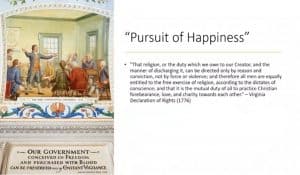Jon Harris is a historian, a theologian, and a podcaster with a growing audience. In this clip, Jon talks about what the Founding Fathers believed about happiness. At minimum, we need to understand what the Founders believed and taught. Better yet, we need to recover and embrace their perspective in our day.

“That religion, or the duty which owe owe to our Creator, and the manner of discharging it, can be directed only by reason and conviction, not by force or violence and therefore all men are equally entitled to the free exercise of religion, according to the dictates of conscience; and that it is the mutual duty of all to practice Christican forbearance, love, and charity towards each other.” — Virginia Declaration of Rights (1776)

“Rights and Responsibilities: Thomas Jefferson”
By our political compact we gain “our equal right to the use of our own faculties, to the acquisition of our industry, to honor and confidence from fellow citizens.” What must we give to secure such rewards? Faithfulness to our “benign religion” in what is common to the various forms: “honesty, truth, temperance, gratitude, and love of man.” — Thomas Jefferson, 1st Inaugural (1801)
ITEMS FOR REFLECTION AND DISCUSSION
-
-
- What is the difference between the Founders’ perspective on happiness and the modern perspective?
- What is equality according to Jefferson. (See item 6 on this list.)
- What is the relationship of private property to happiness?
- Draw a distinction between happiness derived from using one’s property as one sees fit and materialism (the belief that things, in and of themselves, can make a person happy and fulfilled). How are these different?
-
The audio clip provided on this page is taken from this video. The video was released on August 10, 2020, is titled “The Founding Fathers on Rights and Responsibilities,” and is one of Jon Harris’s “Conversations That Matter” podcasts.
Go here to visit Jon’s website, and here to visit his You Tube channel.
This page is part of a larger article or Bible study.
Teaching guide and study items copyright © 2021 by B. Nathaniel Sullivan. All rights reserved.
